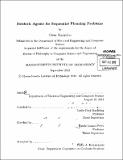| dc.contributor.advisor | Leslie Pack Kaelbling and Tomás Lozano-Pérez. | en_US |
| dc.contributor.author | Macindoe, Owen | en_US |
| dc.contributor.other | Massachusetts Institute of Technology. Department of Electrical Engineering and Computer Science. | en_US |
| dc.date.accessioned | 2014-02-10T16:59:23Z | |
| dc.date.available | 2014-02-10T16:59:23Z | |
| dc.date.issued | 2013 | en_US |
| dc.identifier.uri | http://hdl.handle.net/1721.1/84892 | |
| dc.description | Thesis (Ph. D.)--Massachusetts Institute of Technology, Department of Electrical Engineering and Computer Science, 2013. | en_US |
| dc.description | Cataloged from PDF version of thesis. | en_US |
| dc.description | Includes bibliographical references (pages 127-131). | en_US |
| dc.description.abstract | Effective Al sidekicks must solve the interlinked problems of understanding what their human collaborator's intentions are and planning actions to support them. This thesis explores a range of approximate but tractable approaches to planning for AI sidekicks based on decision-theoretic methods that reason about how the sidekick's actions will effect their beliefs about unobservable states of the world, including their collaborator's intentions. In doing so we extend an existing body of work on decision-theoretic models of assistance to support information gathering and communication actions. We also apply Monte Carlo tree search methods for partially observable domains to the problem and introduce an ensemble-based parallelization strategy. These planning techniques are demonstrated across a range of video game domains. | en_US |
| dc.description.statementofresponsibility | by Owen Macindoe. | en_US |
| dc.format.extent | 131 pages | en_US |
| dc.language.iso | eng | en_US |
| dc.publisher | Massachusetts Institute of Technology | en_US |
| dc.rights | M.I.T. theses are protected by
copyright. They may be viewed from this source for any purpose, but
reproduction or distribution in any format is prohibited without written
permission. See provided URL for inquiries about permission. | en_US |
| dc.rights.uri | http://dspace.mit.edu/handle/1721.1/7582 | en_US |
| dc.subject | Electrical Engineering and Computer Science. | en_US |
| dc.title | Sidekick agents for sequential planning problems | en_US |
| dc.type | Thesis | en_US |
| dc.description.degree | Ph.D. | en_US |
| dc.contributor.department | Massachusetts Institute of Technology. Department of Electrical Engineering and Computer Science | |
| dc.identifier.oclc | 868823103 | en_US |
